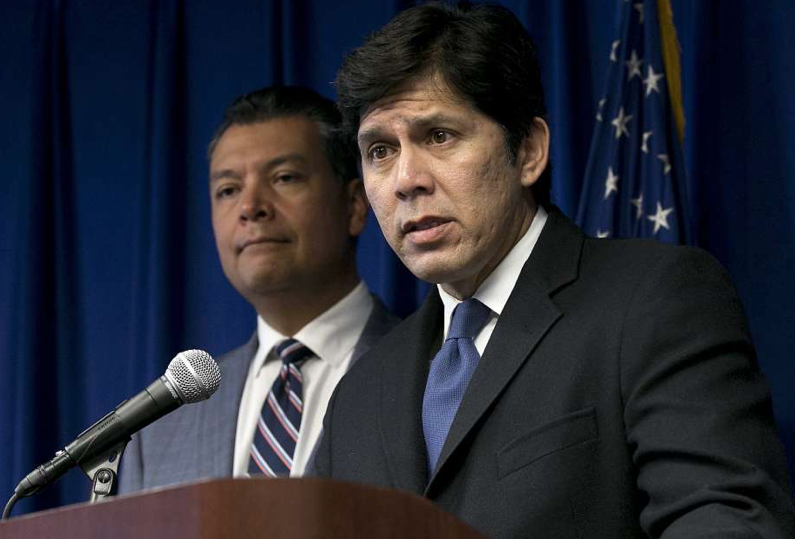CommentsDonald Trump and the Republican Party, increasingly his subsidiary, should be headed to a reckoning of historic proportions.
But, despite his own often unforced errors, Trump may have found an unwitting ally far more impactful than Vladimir Putin: the Democratic Party.
In their anti-Trump fervor, the Democrats have embraced leftist positions that weaken their prospects in 2018 and, perhaps even more so, beyond. This leftward shift was evident in scores of elections around the country as well as here in California where the party endorsed climate activist and open-borders advocate Kevin De Leon over longtime centrist, and still heavily favored, Sen. Dianne Feinstein.
The lurch to the left could become particularly problematic if the economy, always a big if, holds up. Right now almost two-thirds of voters think the economy is in good shape, according to a recent YouGov poll. To be sure, Trump’s approval ratings are not great, but not much worse than those at the same stage of their presidencies as Jimmy Carter, Ronald Reagan, George W. Bush and Barack Obama, all but one of which was re-elected to second term.
Historically disadvantaged minorities
Continued strong economic growth could even help Trump appeal to voters who have historically backed the Democrats. Under President Obama, as Kanye West and others have observed, African Americans gained in self-esteem but little in terms of economics. If you visit the South Side of Chicago, nearby the former Obama manse, poverty has become worse while The Loop to the north has never seemed so prosperous.
In contrast, under Trump’s regime, unemployment among African Americans and Latinos has hit historic lows while wages for blue-collar workers have begun to creep up. Minorities’ sense of personal future prospects have improved markedly, notes the Zogby poll. Trump, despite his remarks about Mexico, is even gaining ground among Hispanics, according to the Harris poll. Latinos, notes Pew, consider health care, the economy and education more important than immigration.
Most minority voters, particularly African Americans, favor less immigration rather than more. The embrace of open borders by Democrats, as evidenced by the calls to dismantle ICE, shows that, like the corporate right, they are unwilling to shut off a supply of undocumented workers whose added presence in the labor market threaten the past 18 month’s still-vulnerable economic gains.
Asians and Jews
Lock-step support for Democrats among Asians and Jews could also be threatened. Jews, despite their self-affiliation as progressives, are faced with a growing anti-Israel, and at least marginally anti-Semitic, wave among “progressive” Democrats. The party’s latest leftist star, New York’s Alexandria Ocasio-Cortez, has made her anti-Israel opinions well known, as have several other Democratic congressional candidates, including in South Carolina and in Pennsylvania, where the party’s choice funded the boycott of Israel.
Progressive Jews make a big deal about the small, and noxious, white nationalist far right and its support for Trump, but the far more lethal threat comes from more powerful situated people like Democratic Party Vice-Chairman Keith Ellison, who has a long history of association with Louis Farrakhan, arguably the most influential anti-Semite of our time. Similar linkages exist among organizers of core resistance groups like the Women’s March.
Democratic dominance among Asians could also be threatened. Trump’s assault on affirmative action appeals to the meritocratic mentality of many Asian families, some of whom fear their offspring face active discrimination in admission to colleges and universities. This concern is also being felt in places like New York, where examinations to high-performing high schools are now being scrapped by progressives seeking to replace merit with a “more just” racial distribution.
Oligarchs and socialists
Perhaps the most serious potential problem for the Democrats lies in the incompatibility of their base of oligarch support, and the simultaneous embrace of socialist ideology. Trump’s trade and immigration policies threaten the interests of the corporate elite, depriving them of potential markets, cheap suppliers and labor. But an assault on inequality — as proposed by Bernie Sanders and his supporters — would also mean higher taxes and more stringent regulations on the oligarchal overclass.
Ultimately the Democrats may try to square this circle by increasing taxes on the upper-middle class, the only ones, outside the oligarchy, capable of paying for expansive socialist policies. Yet this too creates a problem since well-educated professionals constitute one of the key components of the party coalition. Although all the rage among the intelligentsia and the pre-taxpaying young, socialism’s overall appeal remains limited; according to one recent survey, nearly three-quarters of likely voters prefer a free market to a socialistic system.
As the party drifts left, we may see more hesitation by some to participate in a “resistance” that works against their interests. Some Republicans even see the possibility of an anti-progressive wave that could rise as early as this fall. That too may be delusional, given Trump’s repeatedly demonstrated ability to step on his own talking points. But by threatening to alienate sizable parts of the party base, the resistance may yet fail to depose Trump, largely because of its own fundamental contradictions and endemic foolishness.
(Joel Kotkin is the R.C. Hobbs Presidential Fellow in Urban Futures at Chapman University in Orange and executive director of the Houston-based Center for Opportunity Urbanism. He is an occasional contributor to CityWatch.) This piece appeared most recently in New Geography.
-cw

















